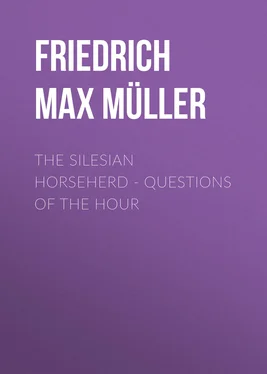Friedrich Max Müller - The Silesian Horseherd. Questions of the Hour
Здесь есть возможность читать онлайн «Friedrich Max Müller - The Silesian Horseherd. Questions of the Hour» — ознакомительный отрывок электронной книги совершенно бесплатно, а после прочтения отрывка купить полную версию. В некоторых случаях можно слушать аудио, скачать через торрент в формате fb2 и присутствует краткое содержание. Жанр: foreign_prose, foreign_religion, Философия, foreign_psychology, foreign_antique, на английском языке. Описание произведения, (предисловие) а так же отзывы посетителей доступны на портале библиотеки ЛибКат.
- Название:The Silesian Horseherd. Questions of the Hour
- Автор:
- Жанр:
- Год:неизвестен
- ISBN:нет данных
- Рейтинг книги:4 / 5. Голосов: 1
-
Избранное:Добавить в избранное
- Отзывы:
-
Ваша оценка:
- 80
- 1
- 2
- 3
- 4
- 5
The Silesian Horseherd. Questions of the Hour: краткое содержание, описание и аннотация
Предлагаем к чтению аннотацию, описание, краткое содержание или предисловие (зависит от того, что написал сам автор книги «The Silesian Horseherd. Questions of the Hour»). Если вы не нашли необходимую информацию о книге — напишите в комментариях, мы постараемся отыскать её.
The Silesian Horseherd. Questions of the Hour — читать онлайн ознакомительный отрывок
Ниже представлен текст книги, разбитый по страницам. Система сохранения места последней прочитанной страницы, позволяет с удобством читать онлайн бесплатно книгу «The Silesian Horseherd. Questions of the Hour», без необходимости каждый раз заново искать на чём Вы остановились. Поставьте закладку, и сможете в любой момент перейти на страницу, на которой закончили чтение.
Интервал:
Закладка:
This could hardly be otherwise, for a religion in its first inception scarcely exists for the outer world. What at that time were Jerusalem and Palestine in the eyes of the so-called world? A province yielding little profit, and often in rebellion. The Jews and their religion had certainly attracted the attention of Rome and Athens by their peculiarities; but the Jewish sects interested the classical world much less than the sects of the Platonic and Stoic schools. Christians were regarded as Jews, just as, not many years ago, Jains were treated by us as Buddhists, Sikhs as Brahmans, and Buddhists, Jains, Sikhs, and Brahmans were promiscuously placed in one pile as Indian idolaters. How should the differences which distinguished the Christian from the Jew, and the Jewish Christian from the heathen Christian, have been understood at that time in Rome? To us, naturally, the step which Paul and his associates took appears an enormous one—one of world-wide import; but of what interest could these things be outside of Palestine? That the Jews who looked upon themselves as a peculiar people, who would admit no strangers, and tolerate no marriages between Jew and Gentile, who, in spite of all their disappointments and defeats, energetically clung to their faith in a deliverer, in an earthly Messiah, and in the coming glory of their nation; that they should suddenly declare clean what they had always considered unclean; that they should transform their national spirit into a universal sympathy; yes, that they should recognise their Messiah in a crucified malefactor, indicate a complete revolution in their history; but the race itself was and continued to be, in the eyes of the world, if not beneath notice, at least an object of contempt. It should not, therefore, surprise us that no classical writer has given us a really historical account of the Christian religion, or has even with one word referred to the wonderful events which, had they actually taken place as described in the Gospels, would have stirred the uttermost corners of the earth. Celsus is the only writer of the second century who, being neither Christian nor Jew, was not only acquainted with representatives of Christianity and Judaism, but had also, it would seem, carefully read portions of the Old and New Testaments. He even boasts of having a better knowledge of these religions than many of their adherents (II, 12). That such a man considered this new Christian sect of sufficient importance to subject it to a searching investigation, is proof of his deep insight, and at the same time of the increasing power of Christianity as a religion independent of Judaism. Who this Celsus really was, it is not easy to discover. Even his adversary, Origen, seems to know but little of him; at any rate he tells us nothing of him,—indeed, we are even still in doubt about his date. It has been thought that he is the Celsus to whom Lucian (120-200 A.D.) dedicated his work on the false Alexander. This is possible; but Celsus is a very common name, and Origen speaks of two men of this name who were both Epicureans and are supposed to have lived in the times of Nero (54-68 A.D.) and Hadrian (118-138 A.D.). It has been argued that the latter could not have been the author of the Sermo Verus , because it apparently mentions the sect of the Marcellians, and this was not founded till the year 155 under Bishop Anicetus. But Origen's remark, that Celsus may have outlived the reign of Hadrian, has been overlooked. At any rate Origen speaks of the Sermo Verus as a work long known, and as he did not die until the year 253 A.D., in his time the work of Celsus would have been recognised as of considerable age, even if written after the year 155. Much learning has been expended on the identification of Celsus, which seems to me to have been wasted. It is remarkable that Origen made no effort to become personally acquainted with his adversary. He leaves the question open whether he is the same Celsus who composed two other books against the Christians ( Contra Celsum , IV, 36). At the end of his book he speaks of him as if he had been a contemporary, and asserts that a second book by him against the Christians, which has either not yet been completed or has not yet reached him, shall be as completely refuted as the Sermo Verus . Such language is only used of a contemporary. Could it be proved that Celsus was a friend of Lucian, then we should know that in the judgment of the latter he was a noble, truth-loving, and cultivated man. It was not Origen's interest to emphasise these aspects of his opponent's character; but it must be said to his credit, that though he was much incensed at some of the charges of Celsus, he never attacked his personal character. Perhaps it was not fair in Origen to accuse Celsus of being ashamed of his Epicureanism, and of concealing his own philosophical and atheistic convictions, in order to obtain an easier hearing among Jews and Christians. 6 6 Contra Celsum , I, 8.
This does not appear quite fair, for it was a very pardonable device for Celsus first to attack a part of Christian teaching under the mask of a Jew, who represents his faith as the older and more respectable, and seeks to convince the Christians that they would have done better had they remained true to the religion of their fathers. On the contrary, as Celsus, whatever he may have been except a Jew, could not with a good conscience have undertaken an actual defence of Judaism, it was quite natural that he should choose a Jew as an advocate of the Jewish religion, and put into his mouth, like a second Philo, ideas which at all events sound more Platonic than Epicurean. Origen was entirely justified in showing that in this process Celsus frequently forgot his part; and this he did with much skill.
But whatever Celsus may have been,—an Epicurean, or, as has occasionally been maintained, a Neo-platonist,—he was at all events no mean adversary and certainly not unworthy of Origen's steel. If not, why should Origen have felt the need of such an earnest refutation? He says, certainly, that he did it only at the request of his old friend and protector, Ambrosius. But that is what many writers under similar circumstances have said and still say. We have, at all events, lost much through the loss (or destruction?) of all manuscripts of Celsus. Not only was he acquainted with the principal philosophical schools of antiquity, he appears also to have studied zealously the religions of the ancient world as they were known at that time to the learned, especially in Alexandria, of which we have but scant knowledge. Origen expressly states (I, 14) that Celsus described the various peoples who possessed religious and philosophical systems, because he supposed that all these views bore a certain relationship to one another. Without a doubt much has been here lost to us, not only for the history of Greek philosophy, but also for the history of Oriental religions and philosophies, whose representatives at that time sojourned in Alexandria, yet as to whose personal influence we are almost entirely in the dark. Celsus is presumed to have written of the doctrines of the Egyptians, the Assyrians, the Jews, Persians, Odrysians, Samothracians, Eleusinians, even of the Samaneans, i.e. the Buddhists (I, 24), and to have represented these as better accredited than those of the Jews. We see anew what treasures were stored up in Alexandria, and we feel all the more deeply their irrevocable loss. The desire and the hope of recovering the work of Celsus were therefore quite natural for any who wished to penetrate more deeply into the spiritual atmosphere of the second and third centuries, and especially for such as strove to understand clearly how men of this age, versed in philosophy, such as Clement and Origen himself, could confess Christianity, or become converted to it, or could defend it against other philosophers without in the least becoming untrue to their philosophical convictions. That the lower classes among Jews and Greeks followed the new teaching, is much more intelligible, even without wishing to lay too much stress on the evidential value of the miracles at that time. The great majority were accustomed to miracles; what was almost entirely lacking was practical religion. The Greek thinkers had created systems of philosophy and morals, but the traditional worship had degenerated into a mere spectacle. Even among the Jews the old religion had become a rigid temple ritual, which offered but little comfort and hope to the weak heart of man. In the eyes of the majority of the philosophers of the age every religion was only pernicious superstition, good enough for the masses, but scarcely worth consideration by the cultured. That Celsus made the Christian religion the object of serious treatment and refutation, not only implies a subtle and unprejudiced view of his age, but shows us at the same time how the Christianity of that period, entirely independent of the Jewish religion, had gained in significance, and had even in the eyes of a heathen philosopher begun to be esteemed as something important, as something dangerous, as something that had to be combated with philosophical weapons.
Читать дальшеИнтервал:
Закладка:
Похожие книги на «The Silesian Horseherd. Questions of the Hour»
Представляем Вашему вниманию похожие книги на «The Silesian Horseherd. Questions of the Hour» списком для выбора. Мы отобрали схожую по названию и смыслу литературу в надежде предоставить читателям больше вариантов отыскать новые, интересные, ещё непрочитанные произведения.
Обсуждение, отзывы о книге «The Silesian Horseherd. Questions of the Hour» и просто собственные мнения читателей. Оставьте ваши комментарии, напишите, что Вы думаете о произведении, его смысле или главных героях. Укажите что конкретно понравилось, а что нет, и почему Вы так считаете.












